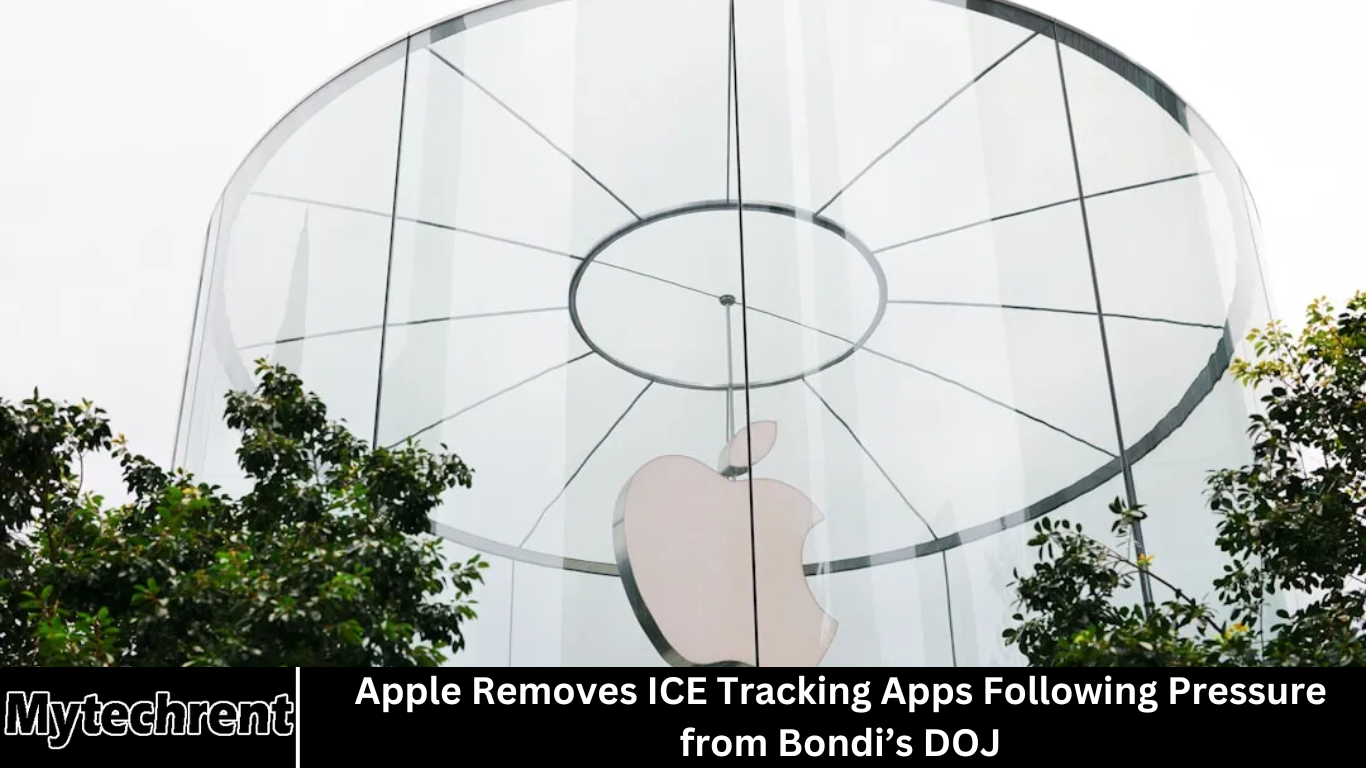In a significant development within the technology and immigration enforcement sectors, Apple Inc., the global tech giant, has removed several tracking applications associated with U.S.
- Background: ICE Tracking Apps and Public Concern
- The Role of Bondi’s DOJ
- Apple’s Response and Policy Considerations
- Implications for Privacy and Civil Liberties
- The Broader Debate: Technology, Ethics, and Law Enforcement
- Reactions from Stakeholders
- Legal and Regulatory Considerations
- The Future of Surveillance Apps and Tech Accountability
- Frequently Asked Question
- Why did Apple remove ICE tracking apps from its App Store?
- What kind of tracking apps were affected?
- What role did Bondi’s DOJ play in this decision?
- How does this affect privacy rights?
- Did law enforcement oppose Apple’s decision?
- What does this mean for the future of surveillance apps?
- Could other states influence tech companies to remove similar apps?
- Conclusion
Immigration and Customs Enforcement (ICE) from its App Store. This action came following mounting pressure from the Office of the Attorney General in Bondi, highlighting growing concerns around privacy, ethical responsibility, and the role of tech companies in law enforcement operations.
More Read: Google Said to Be Testing MediaTek Modem for Tensor G6 in Pixel 11
Background: ICE Tracking Apps and Public Concern
ICE has been known to use advanced technological tools to track and monitor immigration-related activities.
These apps, available on mobile devices, allowed agents to track certain individuals’ locations, monitor movements, and access crucial data in real-time.
While law enforcement agencies argue that these apps aid in operational efficiency and public safety, they have also sparked intense debates regarding privacy violations, civil liberties, and the ethical implications of tech-enabled surveillance.
The apps in question reportedly enabled ICE agents to track undocumented immigrants, monitor compliance with court orders, and manage internal databases.
Critics have argued that these functionalities can lead to disproportionate targeting of vulnerable populations, exacerbate fear within immigrant communities, and pose significant risks if misused or breached.
The Role of Bondi’s DOJ
Pam Bondi, the Attorney General of Florida, has been actively involved in advocating for digital privacy and ethical technology practices.
Her office raised concerns about the potential misuse of tracking apps and the lack of adequate oversight mechanisms. Bondi’s DOJ argued that the apps might violate state-level privacy protections and could expose sensitive personal information to unauthorized access or abuse.
Through a series of communications and formal requests, Bondi’s office urged Apple to reconsider the availability of these applications on its platform.
This pressure reflects a broader trend where state authorities increasingly scrutinize the intersection of technology and law enforcement, particularly when private tech companies facilitate surveillance operations.
Apple’s Response and Policy Considerations
Apple, which has long positioned itself as a champion of user privacy and security, responded by removing the apps from its App Store.
The company cited its commitment to protecting user data and ensuring that applications comply with ethical standards and legal requirements.
Apple’s decision underscores its ongoing balancing act between supporting law enforcement initiatives and safeguarding consumer trust and privacy.
The removal of ICE tracking apps also aligns with Apple’s existing App Store policies, which restrict applications that enable unauthorized surveillance or compromise user privacy.
By taking this step, Apple reinforces its stance on responsible technology deployment and the importance of ethical oversight in the digital age.
Implications for Privacy and Civil Liberties
The removal of ICE tracking apps has broader implications for privacy advocates and civil liberties organizations. Privacy experts have welcomed Apple’s action, viewing it as a precedent for holding technology companies accountable for the applications they distribute.
The decision may encourage other tech giants to scrutinize apps with similar tracking capabilities and assess their alignment with privacy standards and ethical guidelines.
For immigrant communities, the removal of these apps represents a reduction in surveillance-related anxieties. Activists argue that such tools, when misused, can lead to harassment, wrongful detentions, and other negative outcomes.
Apple’s decision therefore contributes to ongoing efforts to protect vulnerable populations from invasive digital tracking and law enforcement overreach.
The Broader Debate: Technology, Ethics, and Law Enforcement
Apple’s removal of ICE tracking apps highlights a broader societal debate: the ethical responsibilities of technology companies in law enforcement operations. While digital tools can enhance operational efficiency, they also pose risks of misuse, privacy violations, and social harm.
Tech ethicists argue that companies like Apple have a duty to evaluate the social consequences of their products and services.
This includes assessing whether apps facilitate unjust targeting, perpetuate systemic biases, or undermine public trust. By removing these apps, Apple demonstrates a proactive approach to ethical technology management, setting a standard for the industry.
Reactions from Stakeholders
The decision has elicited diverse reactions. Privacy advocates, civil liberties groups, and immigrant rights organizations have largely praised Apple for prioritizing ethical considerations and user privacy.
They argue that the move demonstrates that corporate accountability and social responsibility can coexist with business objectives.
Conversely, some law enforcement representatives have expressed concerns that removing these tools may hinder operational efficiency and limit the effectiveness of tracking and monitoring programs.
These stakeholders emphasize the importance of technological support in complex law enforcement activities and argue for balanced solutions that maintain both public safety and privacy protections.
Legal and Regulatory Considerations
Apple’s decision also intersects with ongoing legal and regulatory debates. The removal of ICE tracking apps illustrates the growing influence of state attorneys general in shaping corporate behavior, particularly regarding digital privacy and surveillance.
Bondi’s DOJ leveraged its authority to prompt action, signaling that legal oversight can extend beyond federal mandates and influence corporate compliance with ethical standards.
Moreover, this case may serve as a reference point for future litigation or regulatory initiatives.
Lawmakers and regulators may consider stricter guidelines for the development and distribution of surveillance-related apps, ensuring that privacy protections are embedded in the design and deployment of technology solutions.
The Future of Surveillance Apps and Tech Accountability
The removal of ICE tracking apps raises important questions about the future of surveillance technologies and corporate responsibility.
As digital tracking tools become more sophisticated, technology companies will face increasing pressure to evaluate the ethical implications of their platforms and applications.
Experts suggest that proactive measures, such as rigorous app review processes, transparency reports, and collaboration with civil society, can help mitigate the risks associated with surveillance technologies.
Apple’s action may inspire other companies to adopt similar approaches, fostering a tech ecosystem that prioritizes privacy, accountability, and ethical responsibility.
Frequently Asked Question
Why did Apple remove ICE tracking apps from its App Store?
Apple removed the apps following pressure from the Bondi DOJ due to concerns over privacy violations and ethical implications of surveillance tools used by ICE. The company cited its commitment to protecting user data and ensuring apps comply with legal and ethical standards.
What kind of tracking apps were affected?
The apps allowed ICE agents to monitor individuals’ locations, manage internal databases, and track compliance with court orders. These tools were criticized for potential misuse and disproportionate targeting of vulnerable populations.
What role did Bondi’s DOJ play in this decision?
Pam Bondi’s office raised concerns about privacy violations and urged Apple to reconsider distributing these apps. Their advocacy highlighted the potential risks to personal data and the ethical responsibilities of technology companies.
How does this affect privacy rights?
The removal reduces the risk of invasive surveillance and misuse of personal information. Privacy advocates see it as a positive step toward protecting civil liberties, particularly for immigrant communities.
Did law enforcement oppose Apple’s decision?
Some law enforcement representatives expressed concern that removing these apps could limit operational efficiency. They argued that digital tracking tools are essential for certain law enforcement activities.
What does this mean for the future of surveillance apps?
Apple’s decision sets a precedent for stricter ethical review of apps with tracking capabilities. Other tech companies may follow suit, prioritizing privacy and responsible use of surveillance technologies.
Could other states influence tech companies to remove similar apps?
Yes. State attorneys general, like Bondi’s DOJ, can exert significant influence on corporate practices regarding privacy and ethics, potentially shaping national standards for responsible app distribution.
Conclusion
Apple’s removal of ICE tracking apps, prompted by pressure from Bondi’s DOJ, marks a pivotal moment in the intersection of technology, ethics, and law enforcement.
By prioritizing user privacy and responding to concerns over surveillance misuse, Apple reinforces its commitment to responsible digital practices.
This decision not only sets a precedent for tech industry accountability but also amplifies the role of state authorities in shaping ethical standards in the digital age. As debates around surveillance and civil liberties continue, this move signals a shift toward more transparent, privacy-conscious technology governance.








